 Years ago when I left religious life and moved to a new city I truly owned little. I got a teaching job relatively quickly, but it afforded an incredibly low salary. Because I had no credit history, I had to be ‘creative’ to convince the manager of an apartment complex to let me move in, and for a while I had no furniture to speak of. Often things were a bit desperate; to say the least, it was pretty tough. I learned a fair amount about poverty during that time. There were many nights when my prayer was to be able to pay for rent, food, and to keep my decrepit car from needing yet one more repair. But in all of that, I never despaired because the Lord was incredibly gracious in keeping me from ever getting down to that last penny. God never abandoned me or left me destitute, even if I didn’t have much. In retrospect I see that I was actually quite rich; that is, I was rich in the kindness of others and rich in the care of God. Whenever I was at the end of my money, someone would come through with a kindness, or something would happen that would help my needs to be met. The result is that I have never doubted that with prayer, God will meet our needs if we trust in Him. This does not mean that I got whatever I wanted, when I wanted it. Rather, it means that God gave me what I needed as He saw fit. Please don’t be mistaken: there was suffering involved, especially since there were no guarantees for anything. But I learned an incredible amount during that time especially in recognizing my spiritual poverty in the need to rely on God, to trust in Him no matter what, and to respond in gratitude when I felt His comfort or received His aid. Notice I did not say the gratitude was only for what was received; of course there was gratitude there, but what meant more was experiencing His love and His presence offered especially through family and friends. It taught me to embrace the poverty which is not about things or the lack thereof: it is about putting all of our trust in God, in His wisdom, mercy, and love. 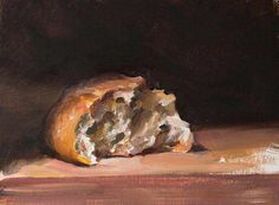 In his Letter to the Philippians St. Paul described this poverty.* He wrote, “Brothers and sisters: I know how to live in humble circumstances; I know also how to live with abundance. In every circumstance and in all things, I have learned the secret of being well fed and of going hungry, of living in abundance and of being in need. I can do all things in Him who strengthens me…. My God will fully supply whatever you need, in accord with His glorious riches in Christ Jesus.” (Phil 4:12-13, 19, italics mine) The truth of this, often missed in the midst of difficult times, is that there are great riches in God and He freely offers them to us. While we do need the material to live, it is the loving touch of God that sustains and underpins everything: we are certainly not alone and have more than we think in our friends, family, and church communities. And whether we are materially rich or poor, the Lord will give the spiritual aid we need, the strength to persevere when we need it most. He is always with us and nothing can separate us from Him. (Romans 8:31-39) 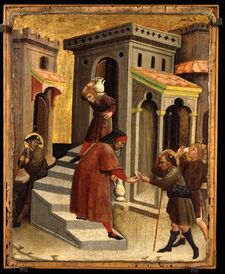 We must also realize that we might be the ones to help those who see no end to their suffering. Just as people came to my aid in unexpected ways, perhaps we are called to reach out from our surplus to help those who do not have the means to survive financially or who need assistance at home for whatever reason. When we participate ‘in person,’ we become Christ to others, a strong message of evangelization as we offer mercy, kindness, care, and action. If the occasion also arises that we can verbally evangelize, such as praying with a person, we can also do that. No matter how we feel about our level of eloquence, a simple prayer is as powerful as one with lots of verbiage. The point is our sincerity and intention, not the amount or type of words used. We can also give ‘anonymously’ through donations of food, clothing, money, and goods (even blood!) to organizations that distribute them.  It is important to let the Holy Spirit guide us to do and say what our hearts discern as we put the works of mercy into action. But above all, we need to cultivate in prayer the recognition of our own spiritual poverty; that is, that we can do nothing without God’s help and that with it, we can do all things. In this time of pandemic in which so many are suffering physically or economically (or both), it is important to ask for what we need as well as to offer what we can. Our poverty is our wealth: all of us are poor because we need to rely on God for everything, and as a result all of us are rich in God’s mercy, love, and compassion. As we share with one another of our mutual richness in poverty, let us continually trust in the love of God. Indeed, we will see that we can do all things in Him who strengthens us. 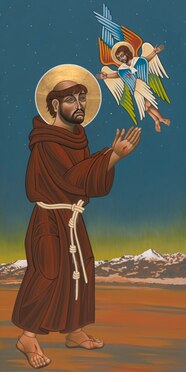 May we have the courage to put everything we have and everything we are into God’s hands! May we turn to the Holy Spirit for discernment as to the best use of our time, talent, and treasure! May we find freedom in embracing our poverty and the richness of God’s grace! May we be diligent in sharing the trust in God and the holy poverty we embrace! And may we learn to love as Jesus does! Let us meet in the heart of Jesus! Peace! ©Michele L. Catanese * This was the second reading from the liturgy of the 28th Sunday in Ordinary Time. Images: 1. My photo, Mt. Cook, New Zealand: I chose this because of the low clouds which partially obscure the mountain. 2. Photo, broken bread: Bread is the food of the poor and of the rich. 3. Icon, Seven Works of Mercy by Olivuccio di Ciccarello da Camerino: This is one of seven icons by the artist in the Vatican Museum Pinacoteca. 4. My photo, Giverny, France: This was taken in the gardens of Claude Monet in Giverny. 5. Icon, St. Francis Patron of Colorado, by Fr. William Hart McNichols. I chose this because the saint who is most identified with both material and spiritual poverty is St. Francis of Assisi. You can find this for purchase, if you want a copy, in one of many mediums at https://fineartamerica.com/featured/st-francis-patron-of-colorado-186-william-hart-mcnichols.html NOTE: In compliance with GDPR rules, I wish to make it clear that I do not gather any information on any of my readers at any time. 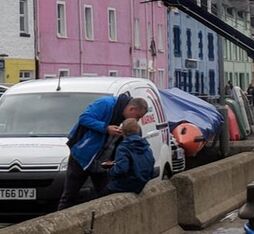 Any parent or anyone who has ever worked with children knows that once a toddler understands the meaning of the word “no” they will start exercising its power. We are all born rather strong willed and although we do not remember our own personal ‘terrible twos’ everyone goes through that phase. If all goes well, we outgrow it, (or at least we should). The mature have learned that their own will is not always the way things will be, or perhaps should be, done. But even the most docile do not naturally like having things go against their own will. That we want our way and not God’s is at the heart of original sin; we ‘deem’ what is ‘fair’ and in doing so, we arrogantly act as if we know better than God does. That is why one of the most profound lines in Scripture is the response of Mary to the archangel Gabriel when he announced that she would be the mother of the Son of God: “May it be done to me according to your word.” (Luke 1:38) Mary did not grow up knowing this would be the role she had been chosen to fulfill. Therefore when she assented, Mary was knowingly letting go of many thoughts, dreams, and expectations for her future life, entering into an immense unknown. Years later at a wedding in Cana, she would reflect her lifelong commitment to trusting God completely when in reference to Jesus she said, “Do whatever He tells you.” (John 2:5)* 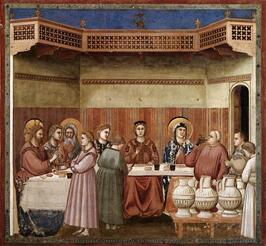 The first of Mary’s two statements was directed at God. She was willing to enter into the unknown because of her great love and trust in the Lord. What followed was a time of joy, but also great suffering: she had revealed her pregnancy to Joseph while they were betrothed, she had fled with her family when Herod wanted to murder Jesus, forced to live in a foreign land for a few years; she lost Jesus in the crowded city of Jerusalem for a few days, and sometime later became a widow. But in all of it she always did the will of God, and thus was able to let go of Jesus when it was time. She did not know that it set Him on the road to death, but as a widow, letting go of her only Son was a huge ‘yes’ to God. Therefore, her second statement to “do whatever He tells you” was directed at us, too: if we do as Jesus instructs, we accept His wisdom, which is far greater than our own. Further, we put ourselves into His hands so that even when we suffer, He is there to comfort and guide. There are no better hands to be in than God’s. 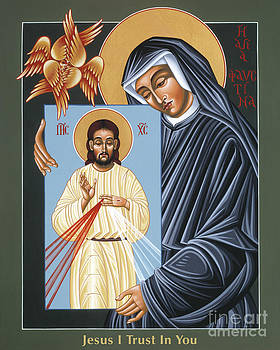 Conforming our will to God’s will is certainly not easy. It wasn’t for Mary, nor was it for any of the other Saints. But a common denominator in their lives is that they placed themselves in God’s hands, allowing His will to be done. One such saint is St. Maria Faustina Kowalska, (1905-1938, feast day October 5). She suffered greatly during her life, especially when she was in the convent, but with the grace of God, she was able to put aside her will and in love, do that which God called her to do. Her life echoed the words of Mary, doing what Jesus asked of her. St. Faustina had visions of Jesus and Mary which she wrote about in her Diary and from which we can learn an immense amount about the “oceans of mercy” offered by Jesus. Because of St. Faustina, we have a special prayer, (the Chaplet of Divine Mercy), a wonderful image of Jesus which she described and had painted, and we celebrate Divine Mercy Sunday on the Sunday after Easter.** It is clear she put God’s will ahead of her own.  If we want to know how to do what God tells us, we need look no further than the Scriptures. In Micah 6:8 we learn what the will of God is for each one of us: “Do justice, love goodness, and walk humbly with your God.” In short, a life of prayer and discernment, and acting on it, is God’s will for us. Jesus taught that we are to love one another as He loves us: love, and the mercy which flows from it, is the foundation to ‘doing justice’ and this is the will of God. Therefore, we must continually return to the Gospels and learn from Jesus and from Mary how to live with trust in God’s presence no matter what befalls us, to trust in the gifts God gives which enable us to love, to bring peace through working for justice with mercy, and to recognize that sometimes the smallest things, if done with great love, can become the greatest miracles of all. 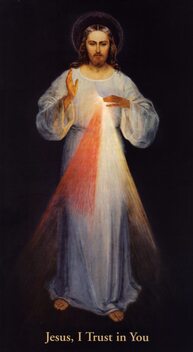 St. Faustina wrote, “Act in such a way that all those who come in contact with you will go away joyful. Sow happiness about you because you have received much from God; give, then, generously to others. They should take leave of you with their hearts filled with joy, even if they have no more than touched the hem of your garment.” Let us do whatever He tells us by living as St. Faustina suggests. What we are called to do is not always complicated, but it means letting go of our chosen way of doing things and doing as Jesus would. If we trust in Him we can make a difference in many lives, including our own. May we ask Mary and Jesus to help us to have the courage to do what God wills rather than what we will! May we ask the intercession of St. Faustina for Divine Mercy to be at the center of our actions! And may we learn to trust in Jesus and thus to do whatever He tells us! Let us meet in the heart of Jesus! Peace! ©Michele L. Catanese *In saying, "Do whatever He tells you," Mary was letting go of any future life with Jesus in her home, allowing her will to yield to God's. Once Jesus performed the miracle of turning water to wine, His public ministry began. Mary was well aware that once Jesus left home, she would be quite vulnerable since a widow was always put in the care of a son in Jewish culture. But she was also telling us to listen to what Jesus, as God, teaches in His gospel message. **If you want to know how to pray the Divine Mercy Chaplet click here: www.usccb.org/beliefs-and-teachings/how-we-teach/new-evangelization/year-of-faith/how-to-pray-the-chaplet-of-divine-mercy Images: 1. My photo, Isle of Skye, Scotland. 2. Fresco painting, The Wedding at Cana, by Giotto. This is found in the Scrovengi Chapel, Padua, Italy. 3. Icon, St. Faustina Kowalska, Apostle Of Divine Mercy by Fr. William Hart McNichols. If you are interested in obtaining a copy you can purchase one at fineartamerica.com/featured/st-faustina-kowalska-apostle-of-divine-mercy-094-william-hart-mcnichols.html 4. My photo, taken near Silverthorne, Colorado. 5. Painting commissioned by St. Faustina Kowalska and her religious community of Jesus as Divine Mercy. NOTE: In compliance with GDPR rules, I wish to make it clear that I do not gather any information on any of my readers at any time. |
Heart Speaks to Heart
|

 RSS Feed
RSS Feed

